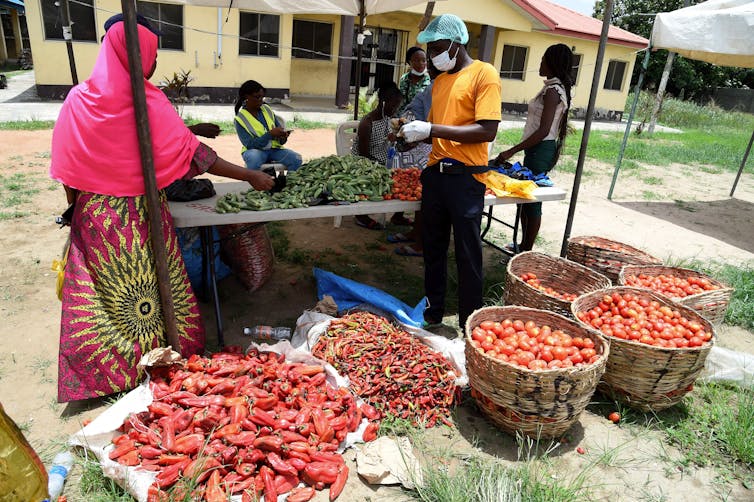
Ademola Adenle, Colorado State University
During the lockdown in Lagos, Nigeria, I joined a humanitarian team to distribute food to poor people in the urban slums. The project was launched because food was not available and accessible to millions of people in Africa’s most populous city.
Given my background in agricultural innovation, I set about trying to understand why the supply of food was so poor – a problem that I know preceded COVID-19. My question took me back into the deep structural flaws that continue to plague Nigeria’s agricultural and food systems. I identified challenges that lie at the heart of food and nutrition insecurity in the whole country, especially the urban slums.
Firstly, that small-scale farmers – who represent over 70% of the agri-food supply chain – have limited access to market. Nigeria’s infrastructure is in a state of disrepair, including roads. And there are no urban and rural freight networks and no long-term logistics plan that guarantees healthy function between strategic locations. There is also limited innovation in the agricultural sector.
I concluded that Nigeria needs a total overhaul of the policies that determine the agricultural sector’s agri-food supply chain. Innovations in technologies – including handling, processing, storage, refrigeration and transport – would be an indispensable component of these policies.
How long will hunger problem persist?
Nigeria faces a chronic hunger problem. More than 70% of Nigeria’s population has suffered hunger during the pandemic. Vendors, such as market women, don’t have food to sell. In addition, without buffer capacity in stores the cost of goods and services skyrocket.
The pandemic appears to have worsened the hunger situation. But Nigeria has faced food shortage problems in the past. High prices of staple food, due to limited domestic production, often drive these shortages. This is due to the neglect of the agricultural sector and high dependence on oil revenue since 1970.
In the past decade, Nigeria spent over US$3 billion annually to import wheat, rice, sugar and dairy products due to limited agricultural production. A myriad of factors contributed to this. These included an underfunded agricultural sector, lack of research and development, limited expertise and weak agricultural extension services.
Continued reliance on imports undermines the agricultural sector. It also poses a significant threat to food and nutrition security in the country.
What needs fixing
Nigeria should prioritise domestic demand before food exports. It must see the agricultural industry as a critical element of economic growth.
Science and innovation policies have an important role to play. This is particularly true of those that target specific needs of rural farmers to deliver high value agricultural products.
One remarkable example has been Brazil’s EMBRAPA initiative. This successful institutional approach transformed traditional agriculture into a modern and competitive industry.
The initiative helped the country meet domestic demands by strengthening local production and food security. It also positioned Brazil as one of the world’s food export leader.
Secondly, Nigeria needs to prioritise new, as well as existing, technologies to boost local productivity. Modern technologies, such as gene-editing and the use of genetically modified organisms, need to be mobilised. So do traditional bio technologies, such as tissue culture and marker assisted-breeding.
Thirdly, Nigeria needs to get modern inputs and industrialised processes embedded in its agriculture sector. The country remains far too dependent on subsistence farming. The country can’t feed itself by continuing to use cutlasses, hoes and rudimentary farming equipment. A modern population of a quarter of a billion people requires modern inputs and industrialised processes.
China, Brazil and Thailand used to be dependent on traditional farming. But each adopted policy innovation to industrialise agricultural sector.
Some policy innovations that would help include:
subsidised financial credit to purchase farm input;
a national agricultural innovation system that drives research and development. Emerging technologies – such as artificial intelligence, big data, precision agriculture and internet of things – need to be mobilised. They could transform Africa’s agricultural value chain into a network of local ecosystems of innovation. Emergency preparedness could then be resilient, and literally homegrown;
human capital development; and,
building physical infrastructure. This should include post-harvest technologies, storage facilities and a good road network. Nigeria needs to create efficient rural-urban connectivity through innovative transport and improved mobility for the agric-food supply chain. Marketing and organisational innovations along the supply chain also need to be strengthened.
Fourth, all hands need to be on the deck to develop effective collaboration across the continent to enable countries to learn from one another. Numerous innovations have been developed elsewhere. These include technologies to improve irrigation as well as information and communication technology and biotech crops. This kind of sustainable innovation involves applying modern technology, efficient machinery and new ways of farming, while minimising the impact on the environment.
My humanitarian experience at the height of pandemic made me realise that a lack of access to food could do more damage if Nigeria continues to reply on food imports. It’s imperative that the government expands the country’s agricultural production in a way that’s driven by science and innovation. This is fundamental to strengthening the agric-value chain. And providing access to affordable and sufficient quantity of nutritious food.
Ademola Adenle, Fellow at the School of Global Environmental Sustainability, Colorado State University
This article is republished from The Conversation under a Creative Commons license. Read the original article.

